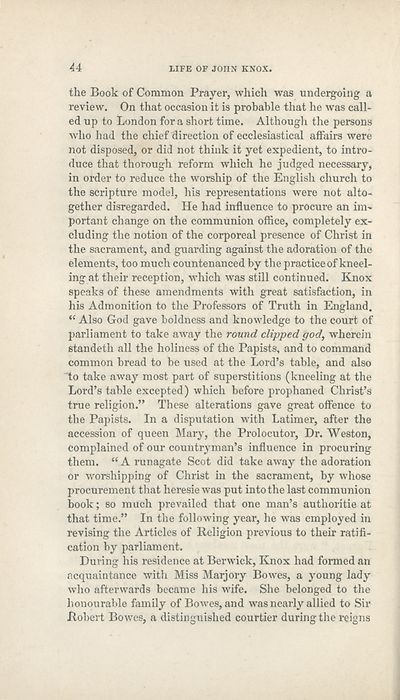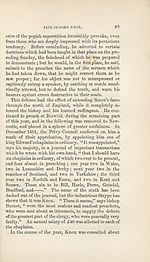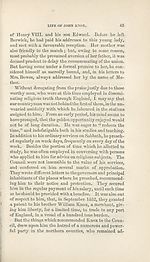Download files
Complete book:
Individual page:
Thumbnail gallery: Grid view | List view

44
LIFE OF JOHN KNOX.
the Book of Common Prayer, which was undergoing a
review. On that occasion it is probable that he was call¬
ed up to London fora short time. Although the persons
who had the chief direction of ecclesiastical affairs were
not disposed, or did not think it yet expedient, to intro¬
duce that thorough reform which he judged necessary,
in order to reduce the worship of the English church to
the scripture model, his representations were not alto¬
gether disregarded. He had influence to procure an im»
portant change on the communion office, completely ex¬
cluding the notion of the corporeal presence of Christ in
the sacrament, and guarding against the adoration of the
elements, too much countenanced by the practice of kneel¬
ing at their reception, which was still continued. Knox
speaks of these amendments with great satisfaction, in
his Admonition to the Professors of Truth in England.
“ Also God gave boldness and knowledge to the court of
parliament to take away the round clipped god, wherein
standeth all the holiness of the Papists, and to command
common bread to he used at the Lord’s table, and also
"to take away most part of superstitions (kneeling at the
Lord’s table excepted) which before prophaned Christ’s
true religion.” These alterations gave great offence to
the Papists. In a disputation with Latimer, after the
accession of queen Mary, the Prolocutor, Dr. Weston,
complained of our countryman’s influence in procuring
them. “ A runagate Scot did take away the adoration
or worshipping of Christ in the sacrament, by whose
procurement that heresie was put into the last communion
book; so much prevailed that one man’s authoritie at
that time.” In the following year, he was employed in
revising the Articles of Religion previous to their ratifi¬
cation by parliament.
During his residence at Berwick, Knox had formed an
acquaintance with Miss Marjory Bowes, a young lady
who afterwards became his wife. She belonged to the
honourable family of Bowes, and was nearly allied to Sir
Robert Bowes, a distinguished courtier during the reigns
LIFE OF JOHN KNOX.
the Book of Common Prayer, which was undergoing a
review. On that occasion it is probable that he was call¬
ed up to London fora short time. Although the persons
who had the chief direction of ecclesiastical affairs were
not disposed, or did not think it yet expedient, to intro¬
duce that thorough reform which he judged necessary,
in order to reduce the worship of the English church to
the scripture model, his representations were not alto¬
gether disregarded. He had influence to procure an im»
portant change on the communion office, completely ex¬
cluding the notion of the corporeal presence of Christ in
the sacrament, and guarding against the adoration of the
elements, too much countenanced by the practice of kneel¬
ing at their reception, which was still continued. Knox
speaks of these amendments with great satisfaction, in
his Admonition to the Professors of Truth in England.
“ Also God gave boldness and knowledge to the court of
parliament to take away the round clipped god, wherein
standeth all the holiness of the Papists, and to command
common bread to he used at the Lord’s table, and also
"to take away most part of superstitions (kneeling at the
Lord’s table excepted) which before prophaned Christ’s
true religion.” These alterations gave great offence to
the Papists. In a disputation with Latimer, after the
accession of queen Mary, the Prolocutor, Dr. Weston,
complained of our countryman’s influence in procuring
them. “ A runagate Scot did take away the adoration
or worshipping of Christ in the sacrament, by whose
procurement that heresie was put into the last communion
book; so much prevailed that one man’s authoritie at
that time.” In the following year, he was employed in
revising the Articles of Religion previous to their ratifi¬
cation by parliament.
During his residence at Berwick, Knox had formed an
acquaintance with Miss Marjory Bowes, a young lady
who afterwards became his wife. She belonged to the
honourable family of Bowes, and was nearly allied to Sir
Robert Bowes, a distinguished courtier during the reigns
Set display mode to:
![]() Universal Viewer |
Universal Viewer | ![]() Mirador |
Large image | Transcription
Mirador |
Large image | Transcription
| Antiquarian books of Scotland > Scotland/Scots > Life of John Knox ; and, The life of Alexander Henderson > (62) |
|---|
| Permanent URL | https://digital.nls.uk/131833048 |
|---|
| Description | Thousands of printed books from the Antiquarian Books of Scotland collection which dates from 1641 to the 1980s. The collection consists of 14,800 books which were published in Scotland or have a Scottish connection, e.g. through the author, printer or owner. Subjects covered include sport, education, diseases, adventure, occupations, Jacobites, politics and religion. Among the 29 languages represented are English, Gaelic, Italian, French, Russian and Swedish. |
|---|

